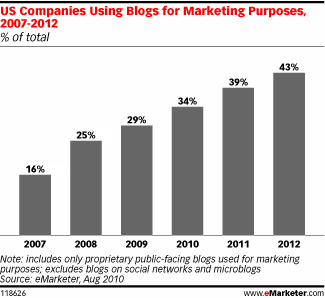We Are Social’s Monday Mashup #46
Social media research task force formed
Big news last week from the Council of American Survey Research Organizations, who established a task force to “address the many ethical and methodological issues developing in the wake of social media research’s emergence”. CASRO cites the “unique and complex issues” associated with social media research regarding privacy, disclosure, and the proper handling of data as the driving force for the move. As you’d expect, we see this as an essential step for the industry and we’ll be following developments closely.
Corporate Blogging Goes Mainstream

Now, you’ve surely seen this headline many times before. But a recent report by eMarketer estimates that:
34% of US companies will use a blog for marketing purposes this year, a proportion that will continue to grow to 43% by 2012.
The study points to a variety of blogging benefits, such as “communications, lead generation, customer service and brand marketing” driving this trend.
Twitter as stock market predictor
Studies have previously found a link between buzz on Twitter and a movie’s success or failure at the box office, but new research from Indiana University is believed to be the first to study Twitter and Wall Street:
Researchers at a US university found they were able to predict the rise and fall of the Dow Jones Industrial Average with near 90 percent accuracy several days in advance by analyzing messages on Twitter.
Researchers measured the ‘collective public mood’ by looking at more than 9.8 million “tweets” from 2.7 million users of the micro-blogging service during 10 months in 2008.
It’s a pretty amazing finding, and one that I imagine will have some social media specialists out there trying to replicate so as to reap the rewards on the stock market. And with an average 90 million Tweets now being sent per day, I wish them well.
We’ll however be trying to emulate the work of Economist-turned-advertising executive Jason Harper, who has developed a “Velocity and Acceleration” model to predict sales results, based on online conversations.
Foursquare Hits 4 Million Users AND outer space
Location-based mobile game Foursquare has passed four million users, according to co-founder and CEO Dennis Crowley. The service hit the 3 million mark a mere 50 days ago, in August 2010. According to GigaOm, this rapid growth can be explained by Foursquare beginning to “see a network effect — the more people sign-up, the faster it grows.”
Bets on when it will hit 5 million?
Meanwhile, one user is worth noting: Doug Wheelock (Astro_Wheels). He’s a Space Station Commander at the International Space Station, and the first to checkin on Foursquare from space. He was also the first person to unlock a new NASA Explorer foursquare badge. Eat your heart out Neil Armstrong.
The checkin is a part of a larger tie up between Fourtsquare and NASA:
Earthbound users will be able to earn the badge when Wheelock returns to earth in late November by following NASA and checking in at their recommended locations. The locations eligible for the badge are all related to the history of spaceflight, like the US Space and Rocket Center in Huntsville, AL or the Kennedy Space Center Visitor Complex.
Foursquare tips have been left at each location, making this a pretty cool partnership and a ‘great way for NASA to connect with a younger generation’.
Journalism on Twitter – two different takes
A well-publicised Twitter gaff by a Washington Post staffer last week prompted an internal memo to be sent telling all journalists “not to answer critics from Post-branded Twitter accounts or to use their personal accounts to ‘speak on behalf of the Post’.”
The memo was sent after a controversial guest article was published in the wake of a number of suicides by US teenagers who were bullied for being gay. The article, which argued that homosexuality is a mental health issue, was met with complaints via Twitter and blogs. A post staffer tried to defend the publishing of the article, which only fueled more controversy. The tweet was later described by the Post as “misguided both in describing our rationale for publishing the piece and as a matter of practice.”
But, while the Post is trying to discourage the use of branded Post accounts to answer critics, The Guardian is taking a slightly different position to social media with their new guidelines.
The Guardian encourages their staff members to participate in conversations about the Guardian’s content, to present facts and embrace reader’s additional knowledge.
Which? launches first online community
Independent consumer rights group Which? has launched its first online consumer rights community, called Which? Conversation aimed at promoting debate around “technology, travel and transport, home and energy and money.” Which? Writers and guest bloggers will be contributing to the community, and the group intends to use it to keep their ‘finger on the pulse of the issues that really matter to consumers’.
Customers Asked to Share Handy Uses for Vaseline
Just in time for Vaseline Petroleum Jelly’s 140th birthday, the company launched new packaging as part of a wider social media campaign to ask customers about the many ways they use the product “other than its original intended purpose.”
The promotion is being conducted on a dedicated Vaseline Facebook page and on Twitter, and the 140 best use cases will be compiled into a video montage by the brand to share with others. I’m not sure I’d want to be the moderator for that competition.
And there’s more – all entrants will automatically be entered in to a sweepstake having the chance to win a limited edition jar of Vaseline, covered in Swarovski crystals. Which answers the call from millions of male consumers for a jar of Vaseline they can finally leave in plain sight…